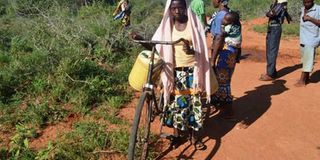Kilifi’s minority Watha ethnic group appeals for official government recognition

A Watha girl going to fetch water using a bicycle. Members of the minority ethnic group living near Tsavo East National park have appealed for recognition by the government saying they have been forgotten. PHOTO | KAZUNGU SAMUEL | NATION MEDIA GROUP
What you need to know:
- They live next to the Tsavo East National Park and say the government has totally forgotten them.
- Jumwa Bajila said no political leader visits the area unless they are on vote hunting campaigns.
- A former administrator said it was impossible to recruit a member of the group as a teacher as none was qualified.
- He appealed to the Watha to embrace education and mingle with other communities.
A minority community living in Ganze, Kilifi County, is now asking the national government to recognise its existence, saying that it has been totally forgotten.
Members of the minority Watha community living adjacent to Tsavo East National Park said Thursday they have been marginalised by the government.
Speaking in Ndharako Village in Bamba Division, members of the community said that public amenities that other Kenyans enjoy from the government seldom reach them yet it is their right to get them.
Barisa Galgalo said the community was side-lined by the government from the time they were chased out of the Tsavo National Park and have since then continued to suffer without government services.
HUNTERS AND GATHERERS
“We are hunters and gatherers and that is why we were staying in the forest but the government chased us out after branding us as poachers.
We have now resorted to farming as a source of livelihood.
“We do not have hospitals in Ndharako and there is no fresh water. The nearest hospital is about 20 kilometres from this area,” he said.
Another resident, Jumwa Bajila, said no political leader visits the area unless they are on vote hunting campaigns.
She said the education of their children is not guaranteed since the area has only one primary school, and that he said has made the area record low levels of literacy.
APPEAL FOR SCHOOLS
“We used to move from one area to the other in animal hunting and honey harvesting but we have now settled.
“The next thing we need are schools and improved infrastructure including roads and water,” she said.
“We are losing our mothers during childbirth and our men loose life mostly from snake bites.
“We want to feel like other Kenyans. That is why we want services from the government,” said Bajila.
The Watha are not officially recognised as an ethnic group by the Kenya government.
According to data from the Kenya National Bureau of Statistics, the Watha they fall under the group of ‘others.’
Their population is not known and in Kilifi County they are found in Ndharako, Magarini, Mwangea and Shirango.
In Ndharako alone, there are about 600 members of the community according to Wario Iyesa.
DESPISED BY OTHERS
Iyesa said they have for long been disregarded by many people in the country and they are always despised.
“People call us Waryangulo which we do not know what it means.
“We live with the Giriama community but they do not want us to marry their daughters despite them marrying ours.
“We want the government to recognise us as Kenyans. We have Kenyan identity cards and people should stop relating us to the Bushmen of South Africa.
“We do not know who the president is and we want him to come so that we can know him,” he added.
Former Ganze assistant county commissioner Stephen Mwanga said the government has been trying to get an educated member of the community to employ without success.
“We wanted an assistant chief from the community but we could not find one with the necessary qualifications.
“We even do not have members [of the community] who qualify to be teachers.
“It’s the high time they started mingling with other communities,” said Mr Mwanga.




